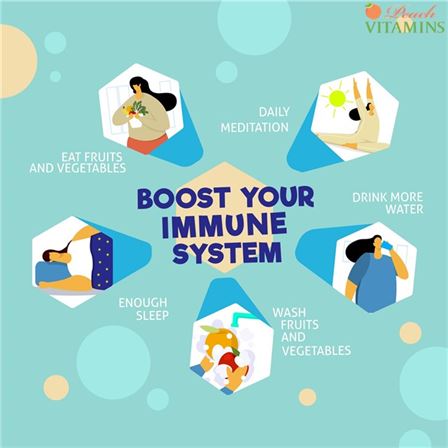There are several misconceptions about the human immune system. It’s often believed that getting sick helps build immunity. When it comes to our immune system, getting sick isn’t always a good thing. The immune system is the body’s defense against foreign invaders, such as bacteria, viruses, parasites, and toxins.
If you’re looking for a quick fix, then yes, you might want to consider taking some supplements. But if you’re interested in making long-term changes to your health, I’d recommend focusing on lifestyle factors like exercise, stress management, and nutrition.
How to Find the Right Balance Between Work and Life
The best way to find a balance between work and life is to make sure that you have both. You can’t be all things to all people. If you try to do so, you will burn out. Instead of trying to juggle everything at once, take one step back now and again to reevaluate what you need to accomplish.
Insufficient sleep: A growing number of researchers believe quality sleep may play an important role in many chronic diseases.
You don’t have to give up sleep altogether. In fact, there are ways to get more restful sleep without sacrificing quality. Here are some tips to help you fall asleep faster and stay asleep longer.
Sleep hygiene: Your bedtime routine plays a big part in how well you sleep. Make sure you stick with a regular sleeping schedule, get plenty of rest before going to bed, avoid caffeine after noon, keep the room temperature cool, and use a dark bedroom environment.
Getting enough healthy sleep is also linked to better moods, improved concentration, and higher energy levels throughout the day.
Consequences of sleep deprivation: Sleep deprivation has been shown to affect brain function, memory, decision-making skills, and physical performance. Some studies even suggest that lack of sleep can cause weight gain.
According to this view, deep sleep (N3 stage) is increased when we are fighting an infection because it is the period of sleep when our metabolism is lowest, freeing up energy to mount a high fever response. (sleepfoundation.org)
Stress and Immune Function – How To Stop Worrying About Everything
Worries can cause stress which leads to fatigue and poor health. Stress and worry can also affect how well the body fights off infections.
Stress affects every aspect of our life, including how we feel physically and mentally. Our bodies respond to stressful situations with elevated cortisol levels, the hormone responsible for regulating our stress response. Cortisol increases heart rate, blood pressure, breathing rate, and muscle tension. In addition, cortisol suppresses the immune system, leading to a weakened resistance to frequent infections.
Cortisol also reduces the number of T-cells, which are part of the immune system. Without enough T-cells, the body cannot defend itself against disease.
The risk of infections rises when cortisol levels increase. This explains why people who suffer from depression or anxiety are more likely to catch colds than those who are not depressed or anxious.
To reduce stress and improve immunity, it is necessary to learn how to deal with stress effectively. Learning techniques that help us relax will decrease cortisol levels and boost immunity.
A few simple relaxation exercises can help reduce stress and improve immune function. These include deep breathing, progressive muscle relaxation, meditation, and yoga.
Research shows that our anti-viral response is suppressed when we feel lonely analysis of 148 different studies involving more than 300,000 people found that people who were more socially connected were 50 percent less likely to die over a given period. (medical.mit.edu)
How Does the Immune System Change with Age?
As we age, our bodies change in many ways. These changes include less energy, slower metabolism, increased risk of illness or injury, and decreased ability to fight disease. These changes can lead to reduced physical strength and stamina. One of the most important aspects of aging is maintaining healthy immune function.
When it comes to the immune system, certain things happen over time. For example, when we get older, our immune systems become weaker. This means that we may not be able to fight off illnesses as effectively as younger adults. However, this doesn’t mean that we should give up hope! There are steps we can take to improve our immune function as we grow older.
One of the best ways to boost immunity is by eating foods rich in vitamin C. Vitamin C has been shown to help strengthen the immune system. Foods high in vitamin C include bell peppers, broccoli, Brussels sprouts, cantaloupe, citrus fruits, kale, kiwifruit, oranges, and strawberries.
Does Being Cold Improve Your Immune System?
We know that colds and flu can wreak havoc on our lives. We spend hours running from healthcare systems to pharmacies to the grocery stores, hoping to find relief before symptoms set in. While antibiotics are effective at treating bacterial infections, they don’t address viral infections.
Flu viruses, rhinoviruses, coronavirus, and adenovirus are all examples of viruses that cause respiratory tract infections. Cold exposure can actually make symptoms worse because of its effect on the immune system. Exposure to cold temperatures can lower immune cell activity. This makes it harder for the body to ward off infection.
Cold weather can also affect our mental state, causing headaches, fatigue, and lethargy. If you have a fever during an outbreak of the common cold, your symptoms may worsen because the virus is replicating faster.
Diet and Your Immune System
Your diet plays an integral role in keeping your immune system strong. Eating a well-balanced diet full of nutrient-rich foods will keep your immune system functioning properly. Here are a few key nutrients that support a robust immune system:
- Vitamin A – Vitamin A supports the development and growth of white blood cells, which play an important role in fighting infection.
- Iron – Iron is essential for producing red blood cells, which carry oxygen throughout the body. Red blood cells are needed to prevent anemia, which weakens the immune system.
- Zinc – Zinc is necessary for proper cell division, which is critical for building new white blood cells.
- Selenium – Selenium is involved in the production of glutathione peroxidase, an enzyme that protects cells from damage caused by free radicals. Free radicals are molecules that contain unpaired electrons. They are produced during normal metabolic processes and can damage DNA and other cellular components.
- Omega-3 Fatty Acids – Omega-3 fatty acids are fish oil, flaxseed oil, walnuts, and soybeans. These fats promote the formation of prostaglandins, hormones that regulate inflammation.
Eating a well-balanced diet full of nutrient-rich foods will keep your immune system functioning properly.
How Can I Boost My Immune System?
Your immune response depends on many factors, including:
- Your genetics – Are you predisposed to having weak immune responses?
- Your environment – Do you live in an area where exposure to pathogens is common?
- The quality of your sleep – Sleep deprivation reduces your immune response.
- Nutrition – What types of food do you eat?
- How much sleep do you get each night – How much restful sleep do you get?
- Exercise – Is your activity level adequate? Moderate exercise can help improve your overall immune function. Exercise increases circulation, which improves the delivery of oxygen and nutrients to your tissues. In addition, regular exercise stimulates the release of endorphins, chemicals that create feelings of euphoria. Endorphins also reduce pain, which can increase your ability to fight disease.
- Medication use – Have you taken any medications recently?
- Infection history – Have you had a recent infection?
- Healthcare provider recommendations – Have you received any medical advice regarding your immune system?
- Whether or not you drink alcohol – Alcohol consumption has increased the risk of upper respiratory tract infections.
- Whether or not you smoke cigarettes – Smoking increases susceptibility to URTI.
How Can I Improve My Immunity with Herbs and Supplements?
Many herbs and supplements contain natural compounds called phytochemicals. Phytochemicals are found in plants and work together to protect the plant from damage caused by insects, fungi, and other environmental factors. They also play an important role in fighting cancer. Many herbal remedies contain phytochemicals, including ginseng, garlic, echinacea, and turmeric.
You can also supplement your diet with probiotic products. Probiotics are live microorganisms that aid digestion. They are beneficial to your overall health. These probiotics are available as powders, tablets, capsules, and liquids.
How To Use Elderberry Syrup?
The benefits of elderberry syrup are numerous. In fact, its list of uses is extensive. Below are just a few examples of how elderberry syrup can benefit you. You’ll be amazed at what elderberry syrup can do for you.
- Boosts the immune system
- Helps reduce inflammation
- Relieves pain and fatigue
- Stimulates the nervous system
- Improves circulation
- Enhances mental clarity
- Promotes healthy weight loss
- Reduces anxiety
Benefits Of Elderberry Vitamins – Elderberry And Autoimmune Disease
While limited clinical studies prove that elderberry extract works as a cure for autoimmune diseases, many people report improvement when using this remedy.
Cold viruses tend to thrive during the winter months. During these cold seasons, it may be tempting to turn to over-the-counter drugs to relieve symptoms.
Elderberry vitamins have shown promise in relieving common cold symptoms. One study showed that elderberry extract effectively reduced sore throat severity in patients who were infected with influenza.
Other studies suggest that elderberry can decrease the duration of viral illnesses, such as colds and flu.
Research suggests that elderberry contains compounds known as polyphenols. Polyphenols are antioxidants that support cell membrane integrity.
How To Make Elderberry Syrup
To make elderberry syrup, mix equal parts elderberries and water in a saucepan over medium heat. Bring mixture to a boil, then simmer until liquid has reduced to half its original volume. Remove from heat and let sit overnight. Strain out solids, then bottle up and enjoy!
Does Elderberry Help With Sinus Infections?
Yes, the benefits of elderberry are well documented. However, its use should be under medical supervision. You know how painful sinus infections can be if you’ve ever had one. If you suffer from chronic sinus problems, then it may be time to try elderberry.
Respiratory infections are widespread during the winter months. This is because we spend more time indoors, which increases the risk of catching colds and flu. While antibiotics help treat respiratory infections, they aren’t effective in preventing them. Antibiotics don’t provide lasting protection against the virus. Instead, focus on boosting your immune system and strengthening your lungs.
Am I Allergic To Elderberry?
Exposure to germs or pollen can cause allergic reactions. For example, a person who suffers from hay fever may experience sneezing, congestion, runny nose, and watery eyes after coming into contact with grass, trees, flowers, dust mites, mold spores, animal dander, or house dust.
Some individuals have allergies to certain foods, medications, chemicals, or even sunlight. Other people experience allergy symptoms without having any obvious triggers. Because of this, doctors use allergy tests to identify the allergen causing an individual’s symptoms.
An allergy test involves collecting a sample of blood or saliva and analyzing it for antibodies specific to the suspected allergen. These tests are not 100% accurate, but they can determine whether someone has developed an IgE antibody response to a particular substance.
Conclusion: Does Getting Sick Build Immune System
Many myths surround the immune system. Some of these myths are true, while others are false. Regardless of what you believe, it’s important to recognize the truth about the immune system. Knowing how the immune system works can help you care for yourself more effectively when you are sick.
Schedule a free consultation with Ayurvedic nutritionist Cosmic Mike to learn more about how immune health and lifestyle affect overall health.
[wps_products product_id=”1638848233507″ html_template=”product.php”]







